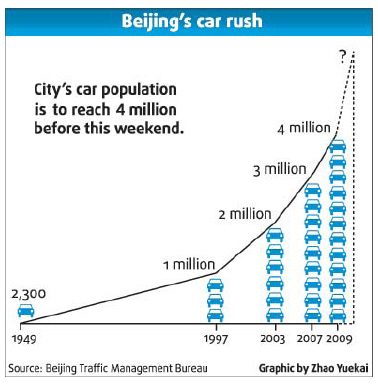4 m cars to bring problems
By Cui Xiaohuo (China Daily)
Updated: 2009-12-16 09:43
 |
Large Medium Small |

Wan Huaiyu said he does not care whether his second car would become Beijing's historic four-millionth vehicle.
"It's my car. I have a real need to own it, whether it is the four millionth or the five millionth," the 30-year-old businessman told METRO as he steered his parents and sister into a brand new 110,000-yuan Beijing Hyundai Elantra at the largest auto market in Beijing last Sunday.
The Beijing traffic management bureau yesterday put the city's car population at an unprecedented 3.99 million as of last Sunday, predicting the number would break four million before the weekend. The news came with a warning though, that roads in Beijing would continue to suffer from congestion if the same growth rate continues.
However, few car buyers seemed to believe in the government's latest words of caution. In fact, the opinion of many is that the government wants them to contribute to the world's largest auto industry and the nation's GDP growth.
Wan said that congestion would not stop him from adding another car to his collection.

The central government decided last Wednesday to increase the vehicle purchase tax for low-emission cars from Jan 1 next year by 2.5 percent to further boost economic growth. The move immediately sent thousands of buyers after last-minute bargains at Yayuncun auto market.
Last week's car rush pushed the number of cars in the city up another 10,000 and increased Beijing's new drivers up 12,000 to 5.66 million, official numbers showed yesterday.
The two figures were 3.5 million and 5.1 million at the same time last year, a stunning annual growth of 14 percent for new cars and 10 percent for new drivers.
And the obvious impact of a sudden influx of cars and drivers has led to a rise in traffic collisions this year, traffic police said.
"If new drivers could realize they are not steering bikes but actually four-wheeled cars, many collisions might be avoided," Zhang Chenjun, deputy director of the Beijing traffic police command center, told METRO in an interview this week.
"But as a matter of fact, minor accidents like scrapes and rear-end collisions have increased this year and subsequently caused more congestion," Zhang said, without providing statistics.
"The public is paying the price after sacrificing air quality and road efficiency for fast economic growth," Ou Guoli, an economics professor with Beijing Jiaotong University, said yesterday.
"The auto industry has benefited from the car rush, but the cost is too high," he added.
The municipal committee of transport, which draws up the transportation policies for the city, also told METRO in an interview earlier that the city's car rush has grown beyond control in recent years.
However, the government has no obvious plan to ditch its current car ownership policies, which include tax discounts and cheap license fees.
Experts admitted it was now too late to control Beijing's car population from exploding.
"There is no point in controlling the ownership of cars, because Beijing's limited roads were already overrun when it hit the three-million mark," Mao Baohua, a Beijing-based government advisor on transportation policies.
"The car rush is a result of an expanding middle class. The only choice now is to use financial policies such as issuing high emission taxes and parking fees," he said.
Beijing authorities are considering whether to raise parking fees in downtown areas next year and are predicted to implement a congestion tax, following the example of notoriously congested cities like Singapore and London.










